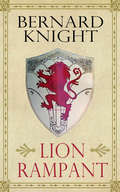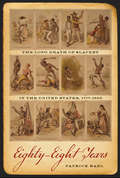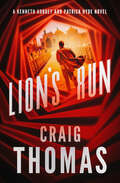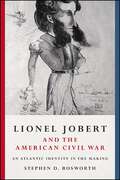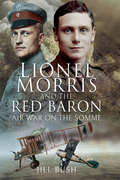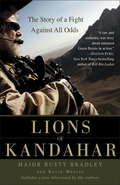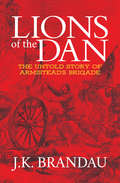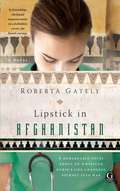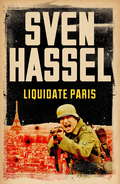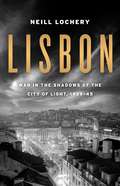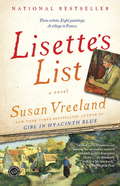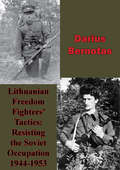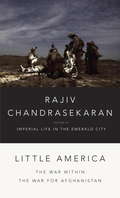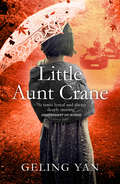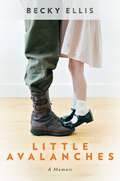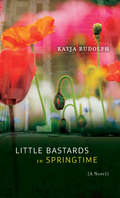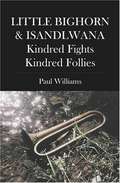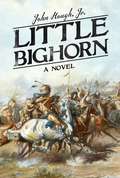- Table View
- List View
Lion Rampant
by Bernard KnightA historical epic by Bernard Knight, Lion Rampant is set in medieval Wales and features the tale of Nest, a princess known as 'the Welsh Helen of Troy'. Nest was a lover of King Henry I of England, married the steward of a Pembrokeshire castle (giving rise to the FitzStephen and FitzGerald families, including Gerald of Wales), and was later abducted by a marauding Welsh noble. This is the story of the adventure, intrigue, and warfare in the various kingdoms of Wales during the twelfth century.
Lion Rampant
by Bernard KnightA historical epic by Bernard Knight, Lion Rampant is set in medieval Wales and features the tale of Nest, a princess known as 'the Welsh Helen of Troy'. Nest was a lover of King Henry I of England, married the steward of a Pembrokeshire castle (giving rise to the FitzStephen and FitzGerald families, including Gerald of Wales), and was later abducted by a marauding Welsh noble. This is the story of the adventure, intrigue, and warfare in the various kingdoms of Wales during the twelfth century.
Lion Rampant - Medieval Wargaming Rules
by Mark Stacey Daniel MerseyLion Rampant is a set of rules designed for fighting historical or Hollywood battles in the medieval period from the Norman Conquest to the Hundred Years' War. This period is well suited to large skirmish gaming as played with Lion Rampant as it was a time of anarchy, feuds, robbery, and raiding. Become Robin Hood, Richard the Lionheart, Gamelyn, William Wallace, Llewellyn the Last, or other legends and leaders from the colorful, dangerous medieval period. Lion Rampant is ideal for players who wish to collect medieval miniatures without wanting to muster huge forces or spend time learning complex rules.Gameplay is very simple, and requires the player to use units in the correct tactical way: knights are great at charging down enemies but less useful for guarding convoys, while spearmen are jacks of all trades and masters of none, and bowmen are to be feared at distance but easily cut down if you can get close enough. An army usually consists of 6-8 units comprised of 6-12 individually based figures (making it ideal for 15mm or 28mm games), and is led by a Leader, who may have some unique character traits that affect game play and provide some opportunity for role playing. The action, however, focuses very much on the small units involved in the battle rather than individual characters: each unit moves and fights independently, assuming that they follow your orders rather than just doing their own thing. Command and control is just as important on the battlefield as the power of a mounted knight.Some army lists are provided, and guidance given for players seeking to create their own forces, but this game is not army list-heavy. The rules include a good number of scenarios, which are important to this style of gaming.
Lion's Run (The Kenneth Aubrey & Patrick Hyde Series)
by Craig ThomasNew York Times–Bestselling Author: A British spy goes into action when his boss is framed for treason in this &“bracing thriller . . . the suspense is galvanizing&” (The Wall Street Journal). After baiting Kenneth Aubrey with a potential defector, the KGB gets their hooks in by framing Aubrey himself as a traitor—and a killer. Now the head of British intelligence is enduring house arrest and interrogation, and things look bleak. His field agent, Patrick Hyde, is convinced someone within their own ranks must have conspired with the KGB to destroy the long-serving spymaster—and his quest to uncover the double agent will take him from Afghanistan to Czechoslovakia and into a top-secret computer system . . . &“A cloak-and-dagger grand tour . . . When it comes to keeping the story moving and stoking up the excitement, Mr. Thomas knows his business.&” —The New York Times
Lionel Jobert and the American Civil War: An Atlantic Identity in the Making
by Stephen D. BosworthMillions of soldiers and civilians passionately supported one side or the other in the American Civil War. For Colonel Lionel Jobert d'Epineuil of the Fifty-Third New York Volunteer Regiment, however, his own advancement mattered more than the outcome of the conflict. This biography analyzes the remarkable exploits of a man driven by ambition—and unhindered by scruples—to attain position and prestige in the Atlantic region during the second half of the nineteenth century.Lionel Jobert (1829–1881) was born in France, but is described as having an Atlantic identity. A ship captain by trade, Jobert exploited unstable governmental conditions in Haiti and the United States to pursue his private interests. Drawing on previously unused sources, Stephen D. Bosworth allows us to view the Civil War from the perspective of a foreign participant whose life constitutes one colorful tile in the vast mosaic that makes up the history of the nineteenth-century Atlantic.
Lionel Morris and the Red Baron: Air War on the Somme
by Jill BushA biography of the young, London-born, World War I pilot who was the first to be shot down by the legendary Red Baron. Nineteen-year-old Lionel Morris left the infantry for the wood and wires of the Royal Flying Corps on the Western Front in 1916, joining one of the world&’s first fighter units alongside the great ace Albert Ball. Learning on the job, in dangerously unpredictable machines, Morris came of age as a combat pilot on the first day of the Battle of the Somme, as the R.F.C. was winning a bloody struggle for admiralty of the air. As summer faded to autumn and the skies over Bapaume filled with increasing numbers of enemy aircraft, the tide turned. On 17 September 1916, Morris&’s squadron was attacked by a lethally efficient German unit, including an unknown pilot called Manfred von Richthofen. As the shock waves spread from the empty hangars of No.11 Squadron all the way to the very top of the British Army, the circumstances surrounding Morris&’s death marked a pivotal shift in the aerial war, and the birth of its greatest legend. Told through previously unpublished archive material, the words of contemporaries, and official records, Lionel Morris and the Red Baron traces a short but extraordinary life and reveals how Morris&’s role in history was rediscovered one hundred years after his death. Praise for Lionel Morris and the Red Baron &“The best written World War I aviation history account this reviewer has read in some time . . . has earned the highest recommendation.&” —Over the Front &“This is a book that deserves to be read.&” —The Aviation Historian
Lionel Robbins
by Susan HowsonBy the time of his death the English economist Lionel Robbins (1898-1984) was celebrated as a 'renaissance man'. He made major contributions to his own academic discipline and applied his skills as an economist not only to practical problems of economic policy - with conspicuous success when he served as head of the economists advising the wartime coalition government of Winston Churchill in 1940-45 - and of higher education - the 'Robbins Report' of 1963 - but also to the administration of the visual and performing arts that he loved deeply. He was devoted to the London School of Economics, from his time as an undergraduate following active service as an artillery officer on the Western Front in 1917-18, through his years as Professor of Economics (1929-62), and his stint as chairman of the governors during the 'troubles' of the late 1960s. This comprehensive biography, based on his personal and professional correspondence and other papers, covers all these many and varied activities.
Lionheart: A rip-roaring epic novel of one of history’s greatest warriors by the Sunday Times bestselling author
by Ben KaneREBEL. LEADER. BROTHER. KING.1179. Henry II is King of England, Wales, Ireland, Normandy, Brittany and Aquitaine. The House of Plantagenet reigns supreme.But there is unrest in Henry's house. Not for the first time, his family talks of rebellion.Ferdia - an Irish nobleman taken captive during the conquest of his homeland - saves the life of Richard, the king's son. In reward for his bravery, he is made squire to Richard, who is already a renowned warrior.Crossing the English Channel, the two are plunged into a campaign to crush rebels in Aquitaine. The bloody battles and gruelling sieges which followed would earn Richard the legendary name of Lionheart.But Richard's older brother, Henry, is infuriated by his sibling's newfound fame. Soon it becomes clear that the biggest threat to Richard's life may not be rebel or French armies, but his own family...'A rip-roaring epic, filled with arrows and spattered with blood. Gird yourself with mail when you start.' Paul Finch'Ben's deeply authoritative depiction of the time is delivered in a deft manner.' Simon Scarrow
Lionheart: The perfect gift for Father’s Day
by Ben KaneREBEL. LEADER. BROTHER. KING.1179. Henry II is King of England, Wales, Ireland, Normandy, Brittany and Aquitaine. The House of Plantagenet reigns supreme.But there is unrest in Henry's house. Not for the first time, his family talks of rebellion.Ferdia - an Irish nobleman taken captive during the conquest of his homeland - saves the life of Richard, the king's son. In reward for his bravery, he is made squire to Richard, who is already a renowned warrior.Crossing the English Channel, the two are plunged into a campaign to crush rebels in Aquitaine. The bloody battles and gruelling sieges which followed would earn Richard the legendary name of Lionheart.But Richard's older brother, Henry, is infuriated by his sibling's newfound fame. Soon it becomes clear that the biggest threat to Richard's life may not be rebel or French armies, but his own family...'A rip-roaring epic, filled with arrows and spattered with blood. Gird yourself with mail when you start.' Paul Finch'Ben's deeply authoritative depiction of the time is delivered in a deft manner.' Simon Scarrow
Lions of Kandahar: The Story of a Fight Against All Odds
by Rusty Bradley Kevin MaurerOne of the most critical battles of the Afghan War is now revealed as never before. Lions of Kandahar is an inside account from the unique perspective of an active-duty U.S. Army Special Forces commander, an unparalled warrior with multiple deployments to the theater who has only recently returned from combat there.Southern Afghanistan was slipping away. That was clear to then-Captain Rusty Bradley as he began his third tour of duty there in 2006. The Taliban and their allies were infiltrating everywhere, poised to reclaim Kandahar Province, their strategically vital onetime capital. To stop them, the NATO coalition launched Operation Medusa, the largest offensive in its history. The battlefield was the Panjwayi Valley, a densely packed warren of walled compounds that doubled neatly as enemy bunkers, lush orchards, and towering marijuana stands, all laced with treacherous irrigation ditches. A mass exodus of civilians heralded the carnage to come.Dispatched as a diversionary force in support of the main coalition attack, Bradley's Special Forces A-team and two others, along with their longtime Afghan Army allies, watched from across the valley as the NATO force was quickly engulfed in a vicious counterattack. Key to relieving it and calling in effective air strikes was possession of a modest patch of high ground called Sperwan Ghar. Bradley's small detachment assaulted the hill and, in the midst of a savage and unforgettable firefight, soon learned they were facing nearly a thousand seasoned fighters--from whom they seized an impossible victory.Now Bradley recounts the whole remarkable story as it actually happened. The blistering trek across Afghanistan's infamous Red Desert. The eerie traces of the elusive Taliban. The close relations with the Afghan people and army, a primary mission focus. Sperwan Ghar itself: unremitting waves of fire from machine guns and rocket-propelled grenades; a targeted truck turned into an inferno; the death trap of a cut-off compound. Most important: the men, Americans and Afghans alike--the "shaky" medic with nerves of steel and a surgeon's hands in battle; the tireless sergeant who seems to be everywhere at once; the soft-spoken intelligence officer with laser-sharp insight; the diminutive Afghan commander with a Goliath-sized heart; the cool maverick who risks all to rescue a grievously wounded comrade--each unique, all indelible in their everyday exercise of extraordinary heroism.From the Hardcover edition.
Lions of the Dan: The Untold Story of Armistead's Brigade
by J.K. Brandau&“Tells the brigade&’s long history for the first time . . . captures the daily grind of soldiers striving and struggling in the ranks . . . A triumph&” (Peter S. Carmichael, Robert C. Fluhrer Professor of Civil War Studies and Director of the Civil War Institute, Gettysburg College). This unique history chronicles those men of Pickett&’s Charge over the full course of the Civil War. While time-honored celebrations of Armistead and Pickett focus narrowly on moments at Gettysburg, primary sources declare the untold story of the best of men in the worst of times, and refutes Lost Cause myths surrounding Armistead and Pickett. For the first time, Lions of the Dan widens the aperture to introduce real heroes and amazing deeds that have been suppressed until now. The author presents the experiences of real soldiers in their own words and highlights the much-ignored history of Southside Virginia, presenting the Civil War start to finish from a unique regional perspective. Readers will find their pedestrian notions of the founding of the South&’s peculiar institution challenged as they read an objective account of Virginia&’s secession and celebrate the courage and devotion of soldiers on both sides.
Lipstick in Afghanistan
by Roberta GatelyRoberta Gately’s lyrical and authentic debut novel—inspired by her own experiences as a nurse in third world war zones—is one woman’s moving story of offering help and finding hope in the last place she expected. Gripped by haunting magazine images of starving refugees, Elsa has dreamed of becoming a nurse since she was a teenager. Of leaving her humble working-class Boston neighborhood to help people whose lives are far more difficult than her own. No one in her family has ever escaped poverty, but Elsa has a secret weapon: a tube of lipstick she found in her older sister’s bureau. Wearing it never fails to raise her spirits and cement her determination. With lipstick on, she can do anything—even travel alone to war-torn Afghanistan in the wake of 9/11. But violent nights as an ER nurse in South Boston could not prepare Elsa for the devastation she witnesses at the small medical clinic she runs in Bamiyan. As she struggles to prove herself to the Afghan doctors and local villagers, she begins a forbidden romance with her only confidant, a charming Special Forces soldier. Then, a tube of lipstick she finds in the aftermath of a tragic bus bombing leads her to another life-changing friendship. In her neighbor Parween, Elsa finds a kindred spirit, fiery and generous. Together, the two women risk their lives to save friends and family from the worst excesses of the Taliban. But when the war waging around them threatens their own survival, Elsa discovers her only hope is to unveil the warrior within. Roberta Gately’s raw, intimate novel is an unforgettable tribute to the power of friendship and a poignant reminder of the tragic cost of war.
Liquidate Paris (Cassell Military Paperbacks Ser.)
by Sven HasselLIQUIDATE PARIS shows the eruption of the Second World War in its most brutal and cruel phase, as allied troops advance upon Paris and the penal regiment retreat.I had a grenade in my hand. So, no doubt, did the English private. I tore out the pin with my teeth. Lay there and counted. Twenty-one, twenty-two, twenty-three, twenty-four...It is Hitler's last chance to save the Third Reich...Millions of Allied troops have landed in Normandy.The orders are clear: Sven and his comrades, hardened by a savage war that has led them from the bloody steppes of the Russian Front, to the slopes of Monte Cassino, are ordered to withdraw to Strasbourg and destroy Paris on the way...
Liquidate Paris (Sven Hassel War Classics)
by Sven HasselLIQUIDATE PARIS shows the eruption of the Second World War in its most brutal and cruel phase, as allied troops advance upon Paris and the penal regiment retreat.I had a grenade in my hand. So, no doubt, did the English private. I tore out the pin with my teeth. Lay there and counted. Twenty-one, twenty-two, twenty-three, twenty-four...It is Hitler's last chance to save the Third Reich...Millions of Allied troops have landed in Normandy.The orders are clear: Sven and his comrades, hardened by a savage war that has led them from the bloody steppes of the Russian Front, to the slopes of Monte Cassino, are ordered to withdraw to Strasbourg and destroy Paris on the way...
Lisbon: War in the Shadows of the City of Light, 1939-45
by Neill LocheryLisbon had a pivotal role in the history of World War II, though not a gun was fired there. The only European city in which both the Allies and the Axis power operated openly, it was temporary home to much of EuropeOCOs exiled royalty, over one million refugees seeking passage to the U. S. , and a host of spies, secret police, captains of industry, bankers, prominent Jews, writers and artists, escaped POWs, and black marketeers. An operations officer writing in 1944 described the daily scene at LisbonOCOs airport as being like the movie ?Casablanca, OCO times twenty. In this riveting narrative, renowned historian Neill Lochery draws on his relationships with high-level Portuguese contacts, access to records recently uncovered from Portuguese secret police and banking archives, and other unpublished documents to offer a revelatory portrait of the WarOCOs back stage. And he tells the story of how Portugal, a relatively poor European country trying frantically to remain neutral amidst extraordinary pressures, survived the war not only physically intact but significantly wealthier. The countryOCOs emergence as a prosperous European Union nation would be financed in part, it turns out, by a cache of Nazi gold.
Lisette's List: A Novel
by Susan VreelandFrom Susan Vreeland, bestselling author of such acclaimed novels as Girl in Hyacinth Blue, Luncheon of the Boating Party, and Clara and Mr. Tiffany, comes a richly imagined story of a woman's awakening in the south of Vichy France--to the power of art, to the beauty of provincial life, and to love in the midst of war. In 1937, young Lisette Roux and her husband, André, move from Paris to a village in Provence to care for André's grandfather Pascal. Lisette regrets having to give up her dream of becoming a gallery apprentice and longs for the comforts and sophistication of Paris. But as she soon discovers, the hilltop town is rich with unexpected pleasures. Pascal once worked in the nearby ochre mines and later became a pigment salesman and frame maker; while selling his pigments in Paris, he befriended Pissarro and Cézanne, some of whose paintings he received in trade for his frames. Pascal begins to tutor Lisette in both art and life, allowing her to see his small collection of paintings and the Provençal landscape itself in a new light. Inspired by Pascal's advice to "Do the important things first," Lisette begins a list of vows to herself (#4. Learn what makes a painting great). When war breaks out, André goes off to the front, but not before hiding Pascal's paintings to keep them from the Nazis' reach. With German forces spreading across Europe, the sudden fall of Paris, and the rise of Vichy France, Lisette sets out to locate the paintings (#11. Find the paintings in my lifetime). Her search takes her through the stunning French countryside, where she befriends Marc and Bella Chagall, who are in hiding before their flight to America, and acquaints her with the land, her neighbors, and even herself in ways she never dreamed possible. Through joy and tragedy, occupation and liberation, small acts of kindness and great acts of courage, Lisette learns to forgive the past, to live robustly, and to love again.
Listen to the Moon
by Michael MorpurgoAlfie and his father find a lost girl in an abandoned house on a small island. The girl doesn't speak, except to say what sounds like "Lucy." Alfie's mother nurses her back to health. <P><P>The others in the village suspect the unthinkable: Lucy is actually German--an enemy--because she's found with a blanket with a German tag. <P><P>Told from Alfie and Merry's points of view, this exquisite novel tells of friends, enemies, and unexpected kindnesses.
Listening to Britain: Home Intelligence Reports on Britain's Finest Hour, May-September 1940
by Paul Addison Jeremy A CrangFrom May to September 1940, a period that saw some of the most dramatic events in British history - including the evacuation of Dunkirk, the Battle of Britain and the opening stages of the Blitz - the Ministry of Information eavesdropped on the conversations of ordinary people in all parts of the United Kingdom and compiled secret daily reports on the state of popular morale.
Lithuanian Freedom Fighters' Tactics: Resisting The Soviet Occupation 1944-1953
by Darius BernotasAlthough the end of World War II enabled devastated countries to rebuild and enjoy a time of peace, another bloody war had just started in Lithuania. Lithuanian Freedom Fighters (LFF) fought for almost a decade (1944-1953) against the Soviets who occupied their country after World War II. This research focuses on LFF tactics that enabled them to oppose greatly superior Soviet forces for an extended period of time and on the factors that resulted in eventual defeat of LFF armed resistance. The research utilized the elements of combat power as the measurement criteria to describe the LFF tactics.The author concludes that the LFF tactics were to some extent effective. LFF managed to adapt tactics in accordance with a changing situation in terms of shifting Soviet tactics and wrong initial assumptions regarding international support. The other factor that contributed to the LFF success fighting the superior enemy for almost a decade was related to LFF ability to mitigate LFF combat power elements' weaknesses while exploiting their strengths.Nevertheless, the absence of both political and material international support along with Soviet success in cutting off population support to the LFF were two main reasons that resulted in the gradual defeat of the armed resistance.As asymmetric warfare is likely to continue playing an important role in future conflicts, members of the military profession should find it useful to familiarize themselves with this research. A thorough analysis of LFF tactics employing a combination of regular and irregular warfare to counter superior forces should assist military professionals in further deepening their understanding of asymmetric warfare phenomena thus contributing to their awareness of contemporary operational environment.
Little America: The War Within the War for Afghanistan
by Rajiv ChandrasekaranFrom the award-winning author of Imperial Life in the Emerald City, a riveting, intimate account of America's troubled war in Afghanistan. When President Barack Obama ordered the surge of troops and aid to Afghanistan, Washington Post correspondent Rajiv Chandrasekaran followed. He found the effort sabotaged not only by Afghan and Pakistani malfeasance but by infighting and incompetence within the American government: a war cabinet arrested by vicious bickering among top national security aides; diplomats and aid workers who failed to deliver on their grand promises; generals who dispatched troops to the wrong places; and headstrong military leaders who sought a far more expansive campaign than the White House wanted. Through their bungling and quarreling, they wound up squandering the first year of the surge. Chandrasekaran explains how the United States has never understood Afghanistan--and probably never will. During the Cold War, American engineers undertook a massive development project across southern Afghanistan in an attempt to woo the country from Soviet influence. They built dams and irrigation canals, and they established a comfortable residential community known as Little America, with a Western-style school, a coed community pool, and a plush clubhouse--all of which embodied American and Afghan hopes for a bright future and a close relationship. But in the late 1970s--after growing Afghan resistance and a Communist coup--the Americans abandoned the region to warlords and poppy farmers. In one revelatory scene after another, Chandrasekaran follows American efforts to reclaim the very same territory from the Taliban. Along the way, we meet an Army general whose experience as the top military officer in charge of Iraq's Green Zone couldn't prepare him for the bureaucratic knots of Afghanistan, a Marine commander whose desire to charge into remote hamlets conflicted with civilian priorities, and a war-seasoned diplomat frustrated in his push for a scaled-down but long-term American commitment. Their struggles show how Obama's hope of a good war, and the Pentagon's desire for a resounding victory, shriveled on the arid plains of southern Afghanistan. Meticulously reported, hugely revealing, Little America is an unprecedented examination of a failing war--and an eye-opening look at the complex relationship between America and Afghanistan.From the Hardcover edition.
Little Aunt Crane
by Geling YanIn the last days of World War II, the Japanese occupation of Manchuria has collapsed. As the Chinese move in, the elders of the Japanese settler village of Sakito decide to preserve their honour by killing all the villagers in an act of mass suicide. Only 16-year-old Tatsuru escapes. But Tatsuru's trials have just begun. As she flees, she falls into the hands of human traffickers. She is sold to a wealthy Chinese family, where she becomes Duohe - the clandestine second wife to the only son, and the secret bearer of his children. Against all odds, Duohe forms an unlikely friendship with the first wife Xiaohuan, united by the unshakeable bonds of motherhood and family. Spanning several tumultuous decades of Mao’s rule, Little Aunt Crane is a novel about love, bravery and survival, and how humanity endures in the most unlikely of circumstances.
Little Avalanches: A Memoir
by Becky EllisA daughter&’s quest for truth. A soldier&’s fight for survival. Their shared search for understanding.Little Avalanches is a gorgeously written memoir of breathtaking scope that propels readers from the beaches of California in the early &‘70s to the battlefields of World War II. As a young girl, Becky is forced to hide from phantom Nazis, subjected to dental procedures without pain medication, and torn from her mother again and again. Growing up in the shadow of her father&’s PTSD, she wants to know what is wrong but knows not to ask. Her father won&’t talk about being a Timberwolf, a unit of specially trained night fighters that went into combat first and experienced a 300 percent casualty rate. He returns home with thirteen medals, including a Silver Star, and becomes a doctor and well-respected member of the community, but is haunted by his past. Seeing only his explosive and often dangerous personality, Becky distances herself from the man she wants to love. Yet on the eve of his ninetieth birthday, when Becky looks at the vulnerable man he&’s become, something shifts, and she asks about the war. He breaks seventy years of silence, offering an unfiltered account of war without glory and revealing the extent of the trauma he&’s endured. She spends the next several years interviewing, researching, and ultimately understanding the demons she inherited. Because his story is incomplete without hers, and hers is inconceivable without his, Ellis offers both, as well as their year-long aching conversation marked by moments of redeeming grace. With compassionate, unflinching writing, Little Avalanches reminds us that we are profoundly shaped by the secrets we keep and forever changed by the stories we share.
Little Bastards in Springtime
by Katja RudolphSpring, 1992. Jevrem Andric is eleven years old and war is erupting in Sarajevo. As the shelling worsens, Jevrem's journalist father and teenaged brother join the Bosnian army. Jevrem, his sisters, his concert pianist mother and beloved grandmother move into the basement.Spring, 1997. Refugee life in Toronto is bleak, and 16-year-old Jevrem and his gang of Yugoslav friends are on a rampage: drinking, smoking weed, popping pills, breaking into houses. Survival means relying on your cunning in an indifferent world. Besides, they relish the adrenaline rush; it reminds them of home.Spring, 1998. After a year in remand, Jevrem has another three in juvenile detention ahead of him, once again trapped in cramped spaces. The only way to save his soul is to escape, and so he does. He hitches rides and as he makes his way west across America toward Los Angeles and his estranged uncle, he feels that it's a chance to leave the repeating patterns of the past behind.
Little Bighorn & Isandlwana: Kindred Fights, Kindred Follies
by Paul WilliamsIn June of 1876 Custer's 7th Cavalry was savagely defeated in the Montana wilderness during an unprovoked war to seize the Sioux and Cheyenne hunting grounds. Turning former nations regarding the Battle of the Little Bighorn on their head, Paul Williams penetrates Custer's mind, revealing the devastating logic for the fatal regimental division which led to his own death and the annihilation of his immediate command. Three years later the redcoat troops of Queen Victoria launched an equally outrageous grab for Zulu lands in South Africa, and repeated Little Bighorn history at Isandlwana with their own humiliating destruction. Lieutenant Colonel George A. Custer and Lieutenant Colonel Anthony W. Durnford had much in common, from mode of dress to tactics employed, and the way they died. Here are riveting stories of the two soldiers and their final battles are interwoven, revealing how, to an astonishing degree, similar aims, tactics, personalities, weapons, incidents and underestimation of so-called savages led to tragic defeat.
Little Bighorn: A Novel
by John Hough Jr.Eighteen year-old Allen Winslow is living what should be every young man’s dream. Thanks to his mother’s charming intercession, he is to ride with the legendary Seventh Cavalry led by Gen. George Custer himself. Traveling west, he meets Addie Grace Lord, whose brother is one of Custer’s regimental surgeons, and the pair falls in love on their journey. As much as Allen wants to make something of himself on the untamed frontier, he soon wants to stay with Addie even more. But neither Allen nor Addie can know where their destinies lie—and neither can foresee the epic events about to tear them asunder. Beautifully written and filled with unforgettable characters both fictional and factual, Little Bighorn brings the American West and its heartbreaking history to life, brilliantly portraying the flawed and tormented Custer.
